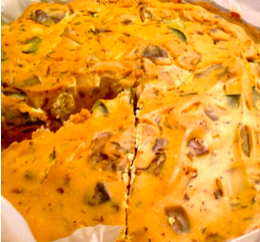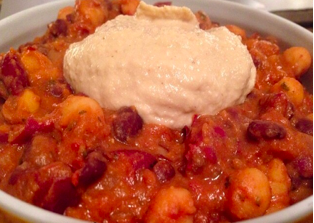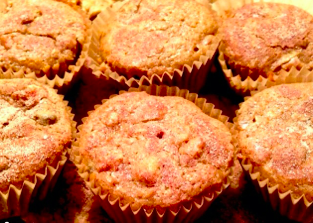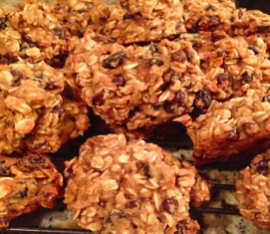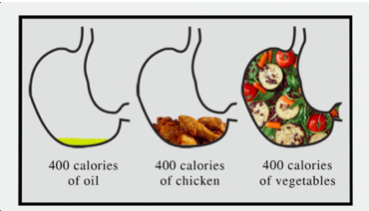Why It’s So Worth It To Go Oil-Free
Why It’s So Worth It To Go Oil-Free
Stop eating animal? Okay. Cut out dairy? Sure. Eat more fruits and veggies? You got it. Stop eating oil? Seriously?
This is what went through my mind every time I tried to stop eating oil. I would get myself on board with the idea, knowing how it would benefit my health, and then a few days or at most, a few weeks in, I would give up. I told myself that I have already cut so many other foods out of my diet that I cannot possibly give up oil, too. Plus, oil is in EVERYTHING. How will I cook and bake? How will I enjoy my food? What on Earth will I eat?
I have gone back and forth with this concept for almost a year. The first time I gave up oil, I did so under the assumption that taking this source of fat out of my diet would help to clear up my acne. And it did. I also shed a few extra pounds effortlessly. However, living at school and cooking for myself made it easy to live without oil. When I came home for the summer, I did not want to cook myself a separate meal from the rest of my family every single night. So, little by little, I allowed oil to creep back in to my diet, eventually taking over almost every meal for the rest of the summer.
Almost immediately, I was back on my skin medication and I had gained back the weight I had lost, and then some. But it was right around this time that my mom and I were lucky enough to attend the Farms 2 Forks immersion at the Esselstyn Farm! Within the first few hours, I listened to Rip Esselstyn, Dr. Campbell and Dr. Esselstyn all speak about the benefits of a low fat, plant-based diet. They sold me. I was ready to switch my olive oil to balsamic vinegars and be done with it.
However, it was not long before I let vegan recipes, coconut oil and vegan meat and butter alternatives get the best of me. I love to bake and I love to cook and I convinced myself that my meals wouldn’t be as satisfying and my baked goods would not be as delicious without processed fats. I was sorely mistaken. In no time, I was back to feeling lousy, and knew that I had to make a conscious effort to remove oil from my diet. In the New Year, I became more mindful of oil in my foods, trying hard not to purchase any foods containing oil, and to leave it out of everything I cooked and everything I baked. It wasn’t so bad.
I am happy to say that I am now 100% oil-free. I feel lighter, more alert and definitely more nourished. I have not refilled the prescription for my skin medication in weeks and I have lost weight effortlessly. My parents are also oil-free, they are also losing weight and my father, who has suffered with sleep apnea for his entire adult life, is now sleeping soundlessly. For me, giving up oil went hand in hand with straying from processed foods. It is so much easier to stock up on fruits, veggies, greens, legumes, beans and whole grains then having to read label after label of your favorite foods, crossing your fingers that they, too, are oil-free.
I no longer feel listless and tired, and I no longer have a “mind-fog” as I go through my day. I attribute all of these feats to purging my diet of oil and oil-filled foods. I am still cooking every meal of the day and baking all of the time. It is definitely not as hard as it seems! It is so easy to cook with a little bit of water instead of oil, and add bananas, apple sauce or flax meal to baked goods instead of the coconut oils, vegan margarines or butter alternatives. This is the best thing I have done for my health, my body and my mental clarity since I have gone plant-based. Here are some photos of my adventures in plant-based, oil-free cooking & baking!
Tofu Veggie Quiche Three Bean Chili topped with oil-free hummus
Apple Cake Muffins Oatmeal Raisin Cookies
But what is it about oil that makes it so controversial? The Mediterranean Diet swears by the health benefits of oils in moderation, and bakers love coconut oil for the health benefits, texture and taste. Plus, who doesn’t cook with olive oil? Almost every recipe advises you to add it to the pan to sauté foods, or add it directly to the foods for a beautiful texture and delicious flavor. But oil is fat, and adding fat to your food, cooking with it and eating it in pre-packaged foods can be very detrimental to your health and wellbeing.
Dr. McDougall states that, “the fat you eat is the fat you wear.” And after eliminating animal foods, oil and concentrated forms of oil, as well as the few high-fat plant-based foods, are all that are left in the diet. Oil is highly processed, pure fat and low in nutrients but exceptionally high in calories. Dr. Esselstyn, a great proponent of this oil-free, plant-based lifestyle, writes, “NO OIL! Not even olive oil, which goes against a lot of other advice out there about so-called good fats. The reality is that oils are extremely low in terms of nutritive value. They contain no fiber, no minerals and are 100% fat calories. Above all, they contain saturated fat, which immediately injures the endothelial lining of the arteries when eaten. It doesn’t matter whether it’s olive oil, corn oil, or any other kind of oil.” More insight on this matter is detailed in Dr. Esselstyn’s book, Prevent and Reverse Heart Disease.
If the benefits of a low-fat, nutrient-dense, plant-based lifestyle can truly prevent and reverse heart disease, why isn’t everyone trading their oils for applesauce and vinegar and embracing this lifestyle? Because oils have been marketed as “healthy fats” for years, and all of this marketing has lead to a job well done by the brands and companies that sell tons and tons of cooking oils each year.
In regard to coconut oil, Jeff Novick, MS, RD, states that, “in spite of having no nutritional value, it is regarded by many as a health food.” One hundred calories of coconut oil has 11.6 grams of fat and 10 grams of saturated fat, over 90% of the total fat in this oil. Those are the only nutrients in coconut oil. Sugar has more nutrients. Coconut oil supplies no carbohydrates, essential fats, vitamins, minerals or proteins. So, it is contributing nothing to the diet except fat, and quite a lot of it. Overall, coconut oil does have some antimicrobial properties, but besides that, it can only offer you fat.
This diet and lifestyle is not fat-free. There is fat in plants, vegetables, fruits, starches, beans and whole grains that we consume, and that is enough. There are also high-fat plant foods, such as nuts, seeds, and avocados. You do not need to add too much of these foods to your daily routine, because even though they are plant-based, they are still high in fat. If you are looking to lose weight or if you have heart disease, Engine 2 Diet and Forks Over Knives recommend that you greatly reduce the presence of these foods in your diet.
Fish oil is another highly debated topic. By consuming fish oil or fish oil supplements, you increase the levels of eicosapentaenoic acid, or EPA, an omega-3 fatty acid popularized for its health benefits. However, Dr. McDougall writes that consumption of fish oil can have adverse effects on health, leading to increased levels of “bad” cholesterol (LDL) in patients with already high cholesterol, leading to worsening diabetes in some. People who take fish oil supplements are also at an increased risk for bleeding. Dr. Esselstyn writes that fish oil is not essential and that it would be hard to become deficient in these omega-3 fatty acids if you are consuming flax seed meal and leafy greens a few times daily. Research suggests that people on plant-based diets suddenly become efficient in manufacturing omega-3s in the body.
In his article about caloric density, Jeff Novick states that by lowering the caloric density of your diet, you will automatically consume foods higher in nutrient density. For example, fruits and vegetables have 60-420 calories per pound and beans and lentils have 310-780 calories per pound. On the other hand, sugars, including agave and maple syrup, have 1,200-1,800 calories per pound, nuts and seeds have 2,400-3,200 calories per pound and, finally, oil has a whopping 4,000 calories per pound. It is so much easier, and so much more satisfying, to nourish the body on a diet based on beans, greens, fruits and grains, as opposed to sugars and fats.
In the end, get rid of the oil. It tastes good, but it will not nourish or support your body, and it will only leave you craving more fat. Experiment with oil-free cooking and baking! Be positive and know that you will still enjoy your food and baked goods, while being 100% confident that you are doing the right thing for your health and your body. Here are some great resources to get started (or continue) with oil-free cooking and baking:
Cooking Without Oil: Cathy Fisher: http://engine2diet.com/the-daily-beet/guest-post-cooking-without-oil-by-cathy-fisher/
Substitutes & Techniques for Oil-Free Baking/Cooking: http://fatfreevegan.com/substitutes-and-techniques-for-fat-free-cooking/
Enjoy!
Resources:
http://engine2diet.com/the-daily-beet/no-oil/
No related posts.

